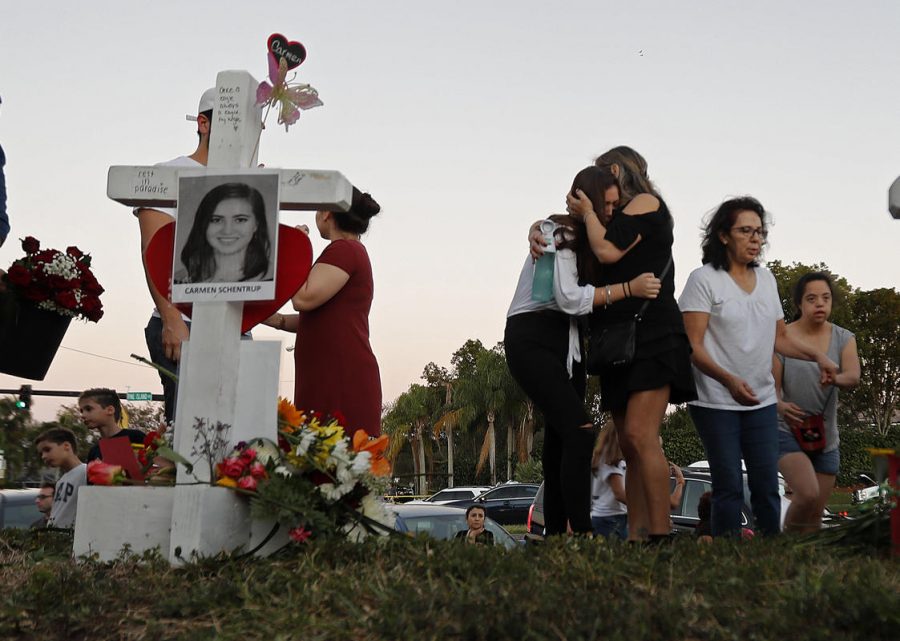Tragedy at Florida High School begs the question: “What if it happens here?”
Terror on Valentine’s Day causes school districts across the country to reassess active shooter procedures.
Magaly Newcomb, right comforts her daughter Haley Newcomb, 14, a student at Marjory Stoneman Douglas High School, at a makeshift memorial outside the school, in Parkland, Fla., Sunday, Feb. 18, 2018. Nikolas Cruz, a 19-year-old who had been expelled from the school, is being held without bail in the Broward County Jail, accused of 17 counts of first-degree murder. (AP Photo/Gerald Herbert)
February 21, 2018
Traditionally, February 14th, Valentine’s Day, is seen as a loving holiday that we spend with laughs and happiness throughout the entire day, but, one week ago, the people in Parkland, Florida experienced a much more dreadful catastrophe this year. Former student of Marjory Stoneman Douglas High School, Nikolas Cruz, 19, decided to take his semi-automatic AR-15 rifle and use it against the Stoneman Douglas community, killing 17 people.
Tragedies like this make all schools, students and teacher stop and think: What if it happened here? How will we respond? Do we have a plan? How can we prevent events like these from taking place? Questions like these have been scattering throughout our building and we search for answers to avoid such violence.
As the number of school shootings gradually rise, we begin to worry about our safety in our schools so we question our preparation for the possibility of such a tragedy potentially taking place at LSE. According to Associate Principal Brent Ailes, LSE will be participating in a lockdown drill sometime this week. He wants and staff to practice “Lights off, out of sight, staying quiet in the classroom.” Principal Brent Toalson says that the recent shooting in Florida “really hit close to home” in terms of being a high school principal.
“I work very hard to keep our school safe and I care a lot about our students. I immediately thought about the work we do everyday and once I started hearing some of the stories of the victims and the people on staff, I thought about how that could be our school. So, I was concerned,” said Toalson.
On Friday, Feb. 16, Toalson delivered a message to the Southeast community over the daily announcements saying, “We do practice a variety of drills, which include what to do if there is an active shooter. For example, in our lockdown drills, teachers lock the classroom doors (although we keep doors lock as a standard practice), turn out the the lights, move students away from sight of the door and windows, maintain silence and wait for the all clear or for a responder to open the door. We practiced this drill last semester and will practice it again in the coming days.”
Toalson has also sent out emails to parents in regard to the shootings in Florida and to explain that LSE does have a protocol set in place if something similar to that were to happen here.
Expecting an upcoming practice of a lockdown drill should make us feel more comfortable. LPS students have trained for such attacks going as far back as first grade. Campus Supervisor Curtis Craig says schools need to be realistic about potential threats to our community. “We have to have practice drills on a regular basis so that everybody is prepared; but you’re never really prepared but at least we have a plan in place that we can use in order to make people [feel] safe.”
Although the ID rules may seem heavily enforced it’s for our own protection and to ensure that we can identify people who enter our building. There are rules set in the building concerning our policies that have not always been here but are now a necessity for times like these. According to Ailes, all exterior doors and classroom doors are required to be locked on closed when class is in session. IDs are another safety measure that administration has really ramped up in the past couple years so that security can identify people who shouldn’t be in the building.
High school is a place of self discovery and how will someone learn to accept themselves if they’re constantly being ridiculed. Be cautious as to how you treat one another, whether it be a friend or a stranger, be kind and always listen carefully to what people have to say. “When you push people so far and they get tired of being pushed behind the eight ball, you know so to speak, so yeah, they get fed up and they’ve had enough so what do they do? They react and try to even the score, without realizing that they’re going to hurt a lot of other people involved.” said Craig.
Toalson wants students to feel safe and wants them to report to an adult in the building if they observe any strange behavior.
“I really think that we have to be partners with students and parents so that when they notice things, even if it turns out to be nothing, no big deal we’d much rather [have] them say ‘Hey, can you go check out this Instagram post or whatever to see if this kid is okay?’. That helps us more than anything else; just for kids to trust us and come and talk to us. We ask students not to feel worried like you’re telling on somebody or getting somebody in trouble because usually this is a good way to tell whether it’s a concern or not and if it is, we’ll help this individual.”








